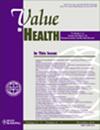Exemption System for Economic Evaluation Data Submission for Pharmaceuticals in South Korea: Achievements and Challenges
IF 6
2区 医学
Q1 ECONOMICS
引用次数: 0
Abstract
Objectives
Since the implementation of the positive listing system in South Korea in 2007, new and improved drugs have been reimbursed based on economic evaluation. Nevertheless, concerns have arisen about reduced accessibility to some drugs. To address this, an Exemption system for Economic Evaluation data submission for pharmaceuticals (EEE) was introduced in 2015 to improve access to drugs with uncertainties in evidence generation. This study aims to assess the institutional and budgetary impact of EEE.
Methods
A descriptive analysis was conducted of the status of EEE-listed drugs. The institutional impact was assessed by evaluating changes in listing rates, time to listing, and cost-effectiveness assessment schemes. The budgetary impact was analyzed by comparing EEE-listed drugs with those listed under other schemes.
Results
The EEE system has positively influenced accessibility, as seen in increased listing rates. By September 2023, 33 ingredients had been listed under the EEE, including 23 for cancer and 6 for rare diseases, with 20 available controlled clinical data. The implementation of the EEE has significantly weakened the role of economic evaluations, especially for cancer and rare disease treatments. The cost per person for EEE-listed drugs was 2.13 to 8.52 times higher, and the number of patients treated with EEE follow-on drugs was substantially larger than those under other schemes.
Conclusions
Given the negative impact of the EEE on deriving appropriate drug values through economic evaluations, there is an imminent need for improved cost management. This can be achieved by implementing a reliable cost-effectiveness evaluation framework that addresses various uncertainties.
韩国药品经济评价数据提交豁免制度:成就与挑战。
背景:韩国自2007年实施正面上市制度以来,对新药和改良药进行了基于经济评价的报销。然而,一些药物的可及性降低引起了人们的关注。为了解决这一问题,2015年引入了经济评估数据提交(EEE)豁免制度,以改善证据产生不确定的药物的可及性。目的:本研究旨在评估电子电气设备对制度和预算的影响。方法:对eee上市药品现状进行描述性分析。通过审查上市费率、上市时间和成本效益评估计划的变化,评估了对体制的影响。通过比较eee列出的药物与其他计划列出的药物,分析预算影响。结果:EEE系统对可访问性产生了积极的影响,如列表率的增加所示。截至2023年9月,已有33种成分被列入EEE,其中23种用于癌症,6种用于罕见疾病,20种可供对照的临床数据。EEE的实施大大削弱了经济评价的作用,特别是对癌症和罕见疾病的治疗。EEE列药的人均成本是其他方案的2.13 - 8.52倍,使用EEE后续药物治疗的患者数量明显大于其他方案。讨论:鉴于EEE对通过经济评价得出适当的药品价值的负面影响,迫切需要改进成本管理。这可以通过实施解决各种不确定因素的可靠的成本效益评估框架来实现。
本文章由计算机程序翻译,如有差异,请以英文原文为准。
求助全文
约1分钟内获得全文
求助全文
来源期刊

Value in Health
医学-卫生保健
CiteScore
6.90
自引率
6.70%
发文量
3064
审稿时长
3-8 weeks
期刊介绍:
Value in Health contains original research articles for pharmacoeconomics, health economics, and outcomes research (clinical, economic, and patient-reported outcomes/preference-based research), as well as conceptual and health policy articles that provide valuable information for health care decision-makers as well as the research community. As the official journal of ISPOR, Value in Health provides a forum for researchers, as well as health care decision-makers to translate outcomes research into health care decisions.
 求助内容:
求助内容: 应助结果提醒方式:
应助结果提醒方式:


